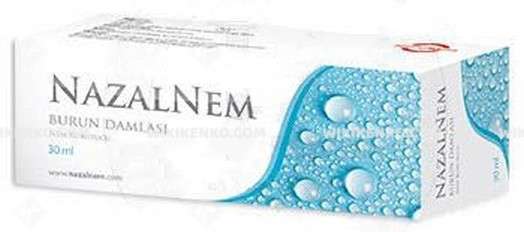Nazalnem Nose Drops
Maintaining optimal nasal health is essential for overall well-being, and Nazalnem Nose Drops offer a potential solution for those seeking relief. We‘ve delved into the details of this pharmaceutical product to provide you with a comprehensive overview of its ingredients, usage, and availability.
| Dosage form | |
|---|---|
| Pack size | |
| Potency | 30Ml |
| Manufacturer | |
| Origin | |
| Generic Name (Ingredient) | D-Panthenol 0.2%, Vitamin A 0.1%. 30 Ml Solution Dropper, Instruction Manual |
Assuming your emergency circumstances for this product, visit Urgent Quotation page. Besides, for any pharmaceutical questions, please ask us in the comments section.
Description
Ingredients and Formulation
Nazalnem Nose Drops are a unique blend of active ingredients carefully selected to address nasal health concerns. Let’s take a closer look at the key components:
D-Panthenol (0.2%)
D-Panthenol, also known as provitamin B5, is renowned for its moisturizing properties. This ingredient helps soothe and hydrate the nasal passages, providing much-needed relief for those experiencing dryness or irritation.
Vitamin A (0.1%)
Vitamin A plays a crucial role in maintaining healthy mucous membranes, which are essential for proper nasal function. This nutrient helps support the overall health and integrity of the nasal tissues.
Packaging and User Guidance
Nazalnem Nose Drops come in a convenient solution dropper format, with each bottle containing 30 ml of the medication. The product also includes detailed instructions on proper usage, ensuring that users can administer the drops correctly and safely.
Nazalnem Nose Drops Usage
Dosage
It’s essential to follow the recommended dosage instructions provided in the manual accompanying the Nazalnem Nose Drops. Adhering to the prescribed dosage is crucial for the medication’s effectiveness and to minimize the risk of potential side effects.
Administration
The Nazalnem Nose Drops are designed to be administered using the solution dropper. Users should carefully follow the instructions on how to properly apply the drops to the nasal passages.
Frequency
The frequency of use for Nazalnem Nose Drops may vary depending on your healthcare provider’s recommendations. It’s important to use the medication as directed to ensure optimal results.
Alternative Nasal Steroid Medications
Given the recent changes in availability, it’s essential to explore alternative options for nasal health. Here are some recommendations:
Corticosteroid Irrigation (CSI)
Description: Corticosteroid irrigation is commonly used after endoscopic sinus surgery for the treatment of severe chronic rhinosinusitis (CRS).
Method: Dissolve Pulmicort respules (budesonide 250 or 500 mcg/2 ml) into a saline rinse solution.
Usage: Up to twice a day.
Safety: There is no evidence of adrenal suppression, but caution is advised in patients on high doses of pulmonary steroids.
Intranasal Corticosteroid (INCS) Sprays
Recommendation: Follow the guidelines outlined in the European Position Paper on Rhinosinusitis and Nasal Polyps (EPOS 2020).
Newer Generation Sprays: Newer generation INCS sprays, such as fluticasone or mometasone, have minimal systemic absorption, making them a safer option.
Maximum Licensed Dose: Use the INCS sprays up to the maximum licensed dose as per the British National Formulary (BNF).
Betnesol Nasal Drops
Usage: Betnesol Nasal Drops can be used as a rescue medication at a dose of 2 drops 2-3 times per day.
Duration: Treatment with Betnesol Nasal Drops should not exceed 6 weeks.
Potential Side Effects
Nazalnem Nose Drops, like any medication, may cause some side effects. It’s important to be aware of these potential adverse reactions and to monitor your body’s response to the treatment.
Temporary Burning and Stinging
Some users may experience a mild burning or stinging sensation in the nose after using the Nazalnem Nose Drops. This is a common and temporary side effect that often subsides with continued use.
Dryness in the Nose
Dryness within the nasal passages is another potential side effect associated with Nazalnem Nose Drops. This can be managed by maintaining proper hydration and following the usage instructions carefully.
Runny Nose and Sneezing
Temporary episodes of a runny nose and sneezing may occur in some individuals after using the Nazalnem Nose Drops.
Nervousness, Nausea, and Dizziness
Although rare, some users may experience side effects such as nervousness, nausea, and dizziness.
Unusual Sweating and Weakness
Monitoring for any unusual sweating or feelings of weakness is also recommended.
Allergic Reactions
While very rare, serious allergic reactions (such as rash, itching, swelling of the face, tongue, or throat, severe dizziness, or trouble breathing) require immediate medical attention.If you experience any unusual or severe side effects, it’s crucial to consult your healthcare provider immediately. Always follow the medical guidance provided when using Nazalnem Nose Drops or any other nasal medications.
Drug Interactions
Nazalnem Nose Drops can potentially interact with other medications, affecting their effectiveness or causing adverse effects. It’s essential to be aware of these potential interactions and to discuss them with your healthcare provider.
Drug-Drug Interactions
Combining two or more drugs that share an active ingredient can lead to side effects or overdose. Always check the drug label for active ingredients and avoid using Nazalnem Nose Drops with medications that may have similar active components.
Specific Combinations to Avoid
- Blood-thinning drugs (e.g., warfarin) with NSAIDs (e.g., ibuprofen)
- Thyroid medication (levothyroxine) with acid-blocking proton pump inhibitors (e.g., omeprazole)
- SSRI antidepressants with other medicines affecting serotonin (e.g., dextromethorphan, linezolid, tramadol, trazodone)
- Cholesterol-lowering statins with azole drugs (e.g., antifungals and fibrates)
Consult Your Healthcare Provider
Always seek professional advice before combining Nazalnem Nose Drops with other medications. Use online tools like WebMD’s Drug Interaction Checker or Drugs.com’s Interaction Checker to identify potential interactions. Remember that individual responses to medications can vary, and it’s essential to discuss any concerns with your healthcare provider.
Dietary Considerations
Nazalnem Nose Drops do not have specific dietary restrictions. However, there are some general guidelines to consider for optimal nasal health:
Hydration
Staying hydrated is crucial. Proper hydration helps maintain healthy mucous membranes and overall nasal function.
Avoid Irritants
Limit exposure to nasal irritants such as smoke, strong odors, and pollutants, as these can exacerbate nasal dryness and discomfort.
Balanced Diet
Consuming a balanced diet rich in vitamins and minerals supports overall health, including nasal health. Incorporate a variety of fruits, vegetables, whole grains, and lean proteins.
Limit Alcohol
Excessive alcohol consumption can dehydrate the body, affecting the nasal passages. Moderation is key.If you have specific dietary concerns or are on a restricted diet, it’s essential to discuss them with your healthcare provider. They can provide personalized guidance to ensure the safe and effective use of Nazalnem Nose Drops.
Use During Pregnancy
Nazalnem Nose Drops can be used during pregnancy, but it’s crucial to consider a few important factors:
Safety of Nasal Sprays
Nasal sprays, including those containing oxymetazoline, are generally considered safe to use during pregnancy.
Nasal Antihistamines
Nasal antihistamines, such as Astepro (azelastine) and Patanase (olopatadine), are also expected to be safe during pregnancy, although no specific pregnancy safety studies have been conducted in humans.
Avoid Phenylephrine and Phenylpropanolamine
Some nasal drops containing phenylephrine and phenylpropanolamine may increase the risk of birth defects and congenital heart disease. It’s best to avoid these ingredients.
Intranasal Corticosteroid Sprays
While there are no sufficient clinical trials, the intranasal use of fluticasone furoate, mometasone, and budesonide is generally considered safe if used at the recommended therapeutic dose after proper medical evaluation.Remember to always consult your healthcare provider before using any medication, including Nazalnem Nose Drops, during pregnancy.
Your provider can offer personalized advice to ensure the safety and well-being of both you and your baby.
Conclusion
Nazalnem Nose Drops offer a potential solution for those seeking relief from nasal health concerns. By understanding the product’s ingredients, proper usage, and potential side effects, users can make informed decisions about their nasal health.
Additionally, exploring alternative nasal steroid medications and being mindful of drug interactions and dietary considerations can help ensure the safe and effective use of Nazalnem Nose Drops. As always, it’s crucial to consult with a healthcare professional for personalized guidance and to monitor any changes or reactions during the course of treatment.
Use the form below to report an error
Please answer the questions as thoroughly and accurately as possible. Your answers will help us better understand what kind of mistakes happen, why and where they happen, and in the end the purpose is to build a better archive to guide researchers and professionals around the world.
The information on this page is not intended to be a substitute for professional medical advice, diagnosis, or treatment. always seek the advice for your physician or another qualified health provider with any questions you may have regarding a medical condition. Always remember to
- Ask your own doctor for medical advice.
- Names, brands, and dosage may differ between countries.
- When not feeling well, or experiencing side effects always contact your own doctor.
Cyberchondria
The truth is that when we’re sick, or worried about getting sick, the internet won’t help.
According to Wikipedia, cyberchondria is a mental disorder consisting in the desire to independently make a diagnosis based on the symptoms of diseases described on Internet sites.
Why you can't look for symptoms on the Internet
If diagnoses could be made simply from a textbook or an article on a website, we would all be doctors and treat ourselves. Nothing can replace the experience and knowledge of specially trained people. As in any field, in medicine there are unscrupulous specialists, differences of opinion, inaccurate diagnoses and incorrect test results.





Reviews
There are no reviews yet.